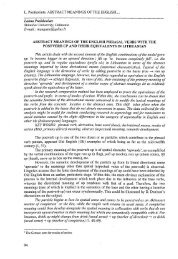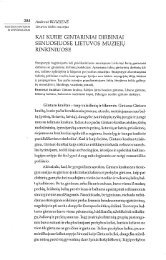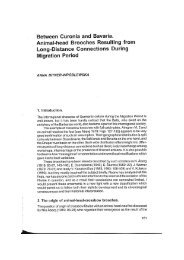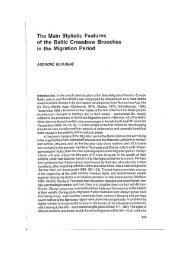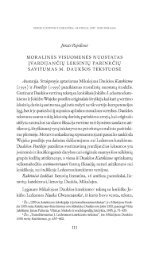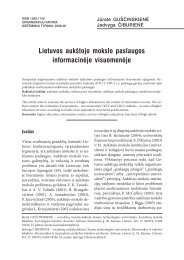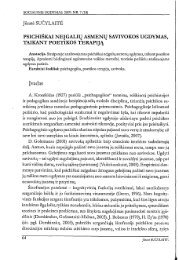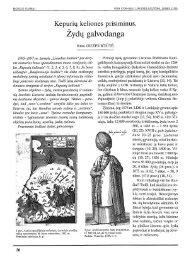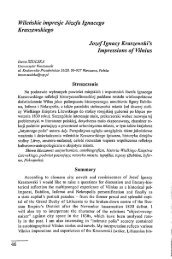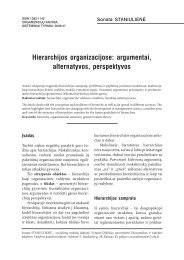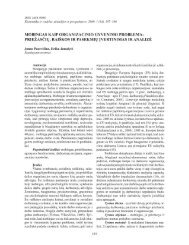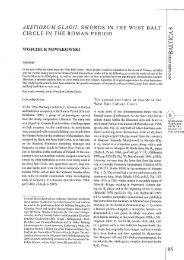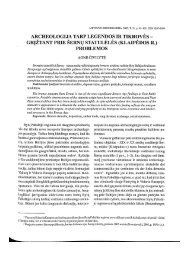ECO-MARKETING AND ECO-LABELLING: DOES IT ENSURE ...
ECO-MARKETING AND ECO-LABELLING: DOES IT ENSURE ...
ECO-MARKETING AND ECO-LABELLING: DOES IT ENSURE ...
Create successful ePaper yourself
Turn your PDF publications into a flip-book with our unique Google optimized e-Paper software.
D.Grundey 170 ISSN 1648-4460<br />
Researching Customer Loyaity in Lithuania<br />
Canada, Mexico and Japan all have some version of COOL regulation though only<br />
Japan has rules as strict as those in the 2002 Farm Bill. One of the main arguments in favour<br />
of COOL, discussed above, has also been used to justify mandatory labelling of genetically<br />
modified (GM) food in Europe. That is, the consumer has a "right to know" what they are<br />
eating. The U.S. government has strongly opposed mandatory GM {genetically modified)<br />
labelling, and for good reason. In practice, GM labelling has not given EU consumers greater<br />
choice, because food processors in Europe have recombined ingredients away from GM food<br />
to avoid labelling. The same phenomenon has taken place in Japan. This pattem may well<br />
develop with COOL and therefore U.S. consumers will not be given a choice because<br />
imported labelled food will not be made readily available. Instead, the imported commodity<br />
will be processed, re-exported or sold into the restaurant or food service industry, to avoid<br />
COOL.<br />
Tabic 5. Comparison of Country-of-Origin Labelling (COOL) Requirements for Food<br />
US Farm Japan Australia & Canada Mexieo The EU<br />
Bill<br />
New Zealand<br />
Retail<br />
yes yes no Varies -<br />
no yes<br />
COOL* for<br />
Ontario and<br />
fresh<br />
produce?<br />
Quebec only<br />
Comments Florida has About 10 Proposal Provincial Grapes,<br />
had<br />
popular under<br />
decision avocados and<br />
mandatory products consideration<br />
mangoes<br />
COOL since covered<br />
have specific<br />
1980<br />
rules<br />
Retail<br />
yes yes no Yes to pre Yes to pre yes<br />
COOL* for<br />
packagedpackaged fresh meats?<br />
meat;<br />
meat;<br />
A^oto<br />
A'oto<br />
imported imported<br />
meat<br />
meat<br />
processed in processed in<br />
Canada Mexico<br />
Comments Exception for Full<br />
Proposal "Processed"<br />
Label must<br />
processed traceability under<br />
is determined<br />
indicate<br />
products within consideration by a rule of<br />
country of<br />
domestic<br />
51% value<br />
birth,<br />
beef industry<br />
added<br />
fattening and<br />
(including<br />
labour)<br />
slaughter<br />
Notes: COOL* - counlry-of-origin labelling.<br />
Source: compiled by the author from various USDA Foreign Agricultural Service attaché reports available at<br />
www.fas.usda.gov<br />
Numerous states have meanwhile got together in the Global Ecolabelling<br />
Network (GEN), founded in 1994. The aim of this interest group,<br />
> with a current membership comprising 26 cco-labcl organisations<br />
— • worldwide, is to foster mutual feedback in regard to national cco-labclling<br />
activities, and to develop the cco-labcl programmes of the individual nations<br />
involved to maximally sophisticated efficacy. The GEN currently includes<br />
members from Belgium, Brazil, Canada, China, Croatia, the Czech republic, Denmark,<br />
Germany, Greece, Hong Kong (Special Adminislrativc Region), Hungary, India, Israel, Japan,<br />
Korea, Luxembourg, New Zealand, Norway, Spain, Sweden (SIS), Sweden (SSNC), Sweden<br />
(TCO), Thailand, the United Kingdom, the USA and Zimbabwe.<br />
TlL'XN.'il-OmATlON.S IN IiU.UNPS\- ó- LiCONOMlCS, Vol. 8. No 1 (16), 2009



